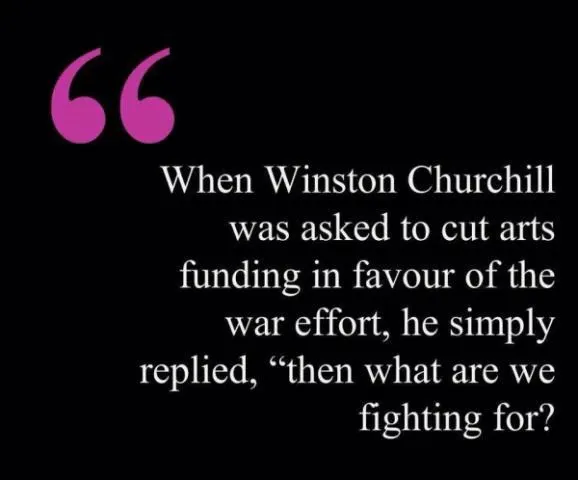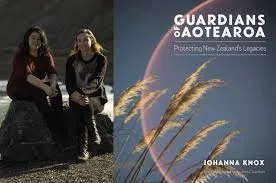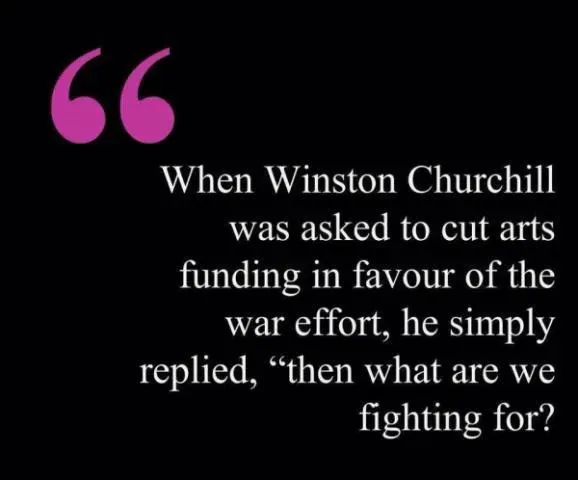Soapbox: That quote that bugged me - a reader reacts
Written by

Under the engaging title What are we fighting for The Big Idea recently published an essay by author Johanna Knox, offering a critical look at the current state of the appreciation of the arts in our political and social environment; a passionate analysis that is true for NZ as it is for Australia, where the article was republished by Artshub. Wolf Heidecker wrote to The Big Idea with his reaction - we believe in the power of a good kōrero, so here is Wolf's open response and call to action:
Arts as an extra
Though I basically agree with Johanna Knox’s sentiment, “Art is not a luxurious extra, it’s a necessity”, and back her expression of advocacy for the arts, there is something that bugged me.
I was quite surprised by my reaction her interpretation of the Winston Churchill quote which she used as a tagline for her argument for the universal social importance of the arts in general.
Johanna said, “There’s a quote that sometimes does the rounds: When Winston Churchill was asked to cut arts funding to support the war effort, he notably replied, ‘Then what are we fighting for?’ It took me till this year to figure out why it bugs me – and it’s not that Snopes says Churchill never said it. It’s what this sentence implies about our work as arts practitioners. Somehow, implicit in its wording is the idea that the arts are an extra – a nice-to-have on top of day-to-day survival.

As a seasoned theatre practitioner and an analyst in behaviour in communications, I am very happy to listen and learn about different opinions and viewpoints. I am lucky enough to have grown up in the industry and having had a career in theatre that saw me inhabit a range of roles from from ticket officer, actor, director to CEO in Germany. Germany is a country which is the envy of artists all over the world. Half of my professional life in the theatre industry I’ve spent in Australia where I am actively involved with several production companies and arts organisations.
For many years I have been using the said Winston Churchill quote on my printed and/or electronic correspondence. I have done and continue doing so - based on some research into peripheral literature – because from my understanding I believe that with his statement, Churchill was expressing exactly the opposite of what Johanna Knox concluded, a conclusion that sounds to me a bit like sentiments from the class-warfare of old.
Entertaining the troops
When a society is involved in war the main focus of politicians, soldiers and the majority of the wider community is to return to peace. Predominantly - of course - by winning against the enemy, whoever that may be. On an individual level each and every person who is affected by the aggression has one aim, i.e. to survive, and to have the basic infrastructure available to do so. It was under the pressure of permanent and increasing demands from the people to provide that fundamental infrastructure that Churchill was asked to redirect funds still available to the arts to the war effort. When he replied “…then what are we fighting for” it was a quite courageous response. He saw the arts, artistic work and artistic expression, probably the entertainment the arts provided, as vital to keeping up morale amongst soldiers and community. Therefore, I believe there is no indication whatsoever, no implication in his wording that “the arts are an extra – a nice-to-have on top of day-to-day survival”. Quite the opposite.
"When there are politicians who openly express their support for the arts as an integral part of social life, don’t fight them. Embrace them as allies. There are very few and precious."
At least in the western world the arts, music, artistic performances have always been seen as important part of warfare, faking a presumed ‘normality’ – worst case as propaganda, best case to entertain the troops and distract the people at home, in the besieged country, where politicians have to apply some kind of ‘panem et circenses’ approach for the same reason the old Romans did in view of maintaining a level of civil rest.
Art is the hammer
When you stop ‘fighting for the arts’ an entire people is prone to lose its identity. History teaches us that up until the most recent conflicts, the arts were used to bargain with the adversaries or even to destroy a culture. Yes, in an ideal world, artists and the society as a whole should not have to fight for the arts, valuing the arts should be integral to a society’s fabric.
"When you stop ‘fighting for the arts’ an entire people is prone to lose its identity."
But in reality, at least in our realm, it is not and we have to fight the fight for recognition and acceptance constantly. And it is not only the funding and governing bodies we have to fight with on a daily basis: especially in Australia, we have to fight for the recognition of the arts and its protagonists of every genre within the wider community. There is no real history of appreciation of the arts in a professional context due to the lack of relevant societal history and education.
Yes, Johanna Knox is right to see “art as a powerful tool” and in reminding the arts community “what we don’t want to do is back ourselves into a corner where we have to fight for art. Art is what we wield. Art is what we must fight with, no matter what.”

Yet, that’s what all artists would agree with as that’s the essence of all art – still, you can only fight with art as long as you have fought to make the arts strong first, i.e. in real life making sure that artists have a solid backing not only in the political realm but the wider community as well.
Call to Action
So, when there are politicians who, like in this instance Winston Churchill, who openly express their support for the arts as an integral part of social life, don’t fight them. Embrace them as allies. There are very few and precious.
About Wolf and Johanna:
Wolf Heidecker moved to Australia in 1997, bringing with him over 25 years of experience as artistic director, tour manager, and chief executive officer/general manager for various German opera and theatre companies. He is a trained performing artist and Business Economist, and has moreover trained as Behavioural & Communications Analyst/ Psychotherapist. He worked as Orchestra Manager in Brisbane, and Director Business & Marketing for Australia's renowned Flying Fruit Fly Circus. Today he manages his company Wolf Heidecker Arts Management, volunteers his skills for a number of not-for-profit organisations, and is directing and producing with Larrikin Ensemble Theatre.
Johanna Knox is a Wellington-based writer, editor and researcher, and the author of Guardians of Aotearoa (Bateman Publishing).
Photo by Arthur Osipyan on Unsplash

